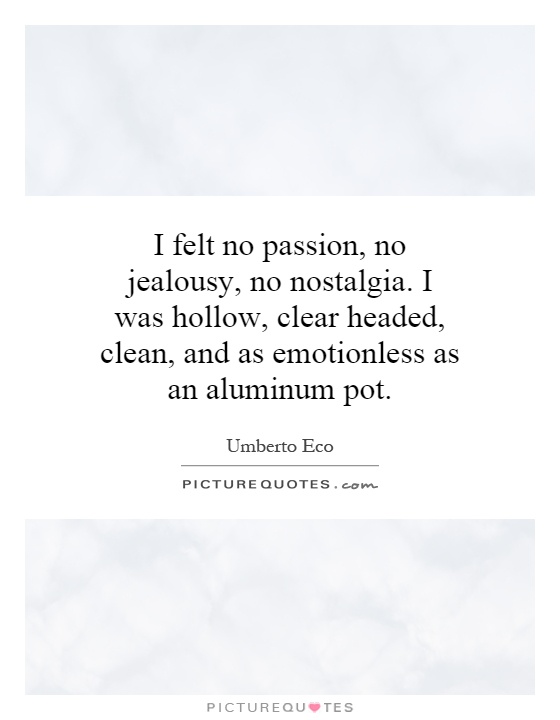I felt no passion, no jealousy, no nostalgia. I was hollow, clear headed, clean, and as emotionless as an aluminum pot

I felt no passion, no jealousy, no nostalgia. I was hollow, clear headed, clean, and as emotionless as an aluminum pot
Umberto Eco, the renowned Italian novelist and philosopher, was known for his intricate and thought-provoking works that delved deep into the complexities of human nature and society. His writing often explored themes of power, politics, and the manipulation of truth, drawing readers into a world of intrigue and intellectual challenge.In his novel "The Name of the Rose," Eco masterfully weaves a tale of murder, mystery, and religious intrigue set in a medieval monastery. The protagonist, William of Baskerville, is a brilliant and rational Franciscan friar who is tasked with solving a series of murders that have occurred within the monastery walls. As he delves deeper into the investigation, William must navigate a web of deceit, power struggles, and hidden agendas, all while grappling with his own inner demons and doubts.
In the midst of this tumultuous and dangerous world, William finds himself struggling to maintain his composure and clarity of mind. He describes feeling "no passion, no jealousy, no nostalgia," and compares himself to "an aluminum pot" – cold, hard, and devoid of emotion. This detachment from his own feelings and desires allows William to approach the investigation with a clear and objective perspective, enabling him to see through the lies and deceptions that surround him.
Eco's portrayal of William as a rational and analytical thinker, unburdened by the weight of his emotions, reflects the author's own philosophical beliefs about the nature of truth and knowledge. Eco was a staunch advocate of semiotics, the study of signs and symbols, and believed that the search for truth required a disciplined and rational approach that transcended personal biases and emotions.












 Friendship Quotes
Friendship Quotes Love Quotes
Love Quotes Life Quotes
Life Quotes Funny Quotes
Funny Quotes Motivational Quotes
Motivational Quotes Inspirational Quotes
Inspirational Quotes